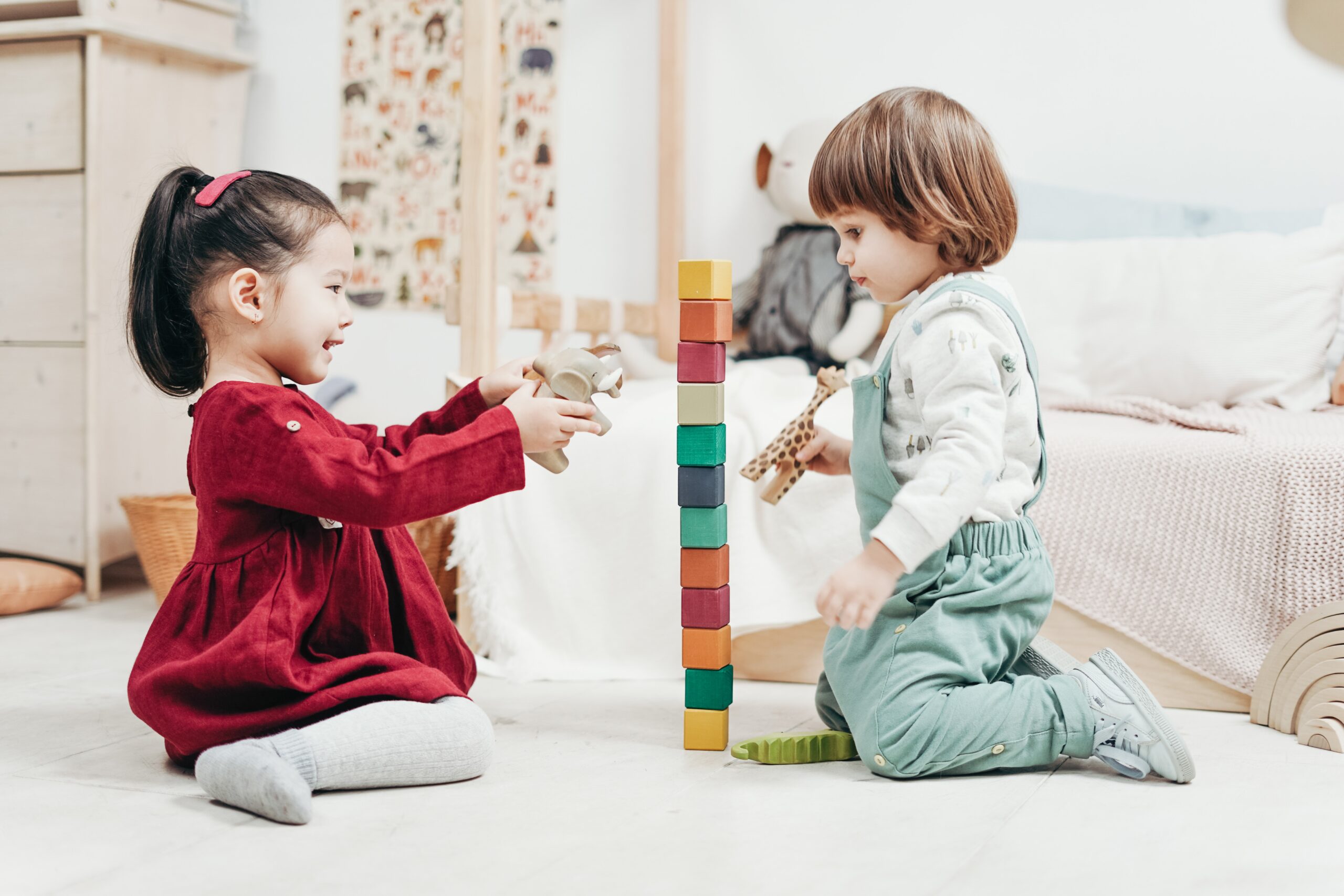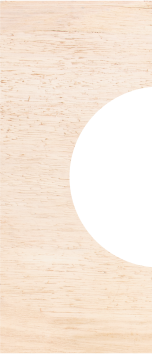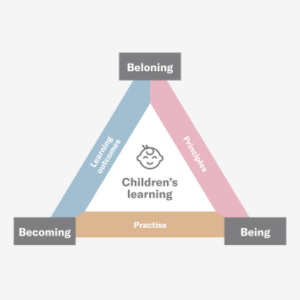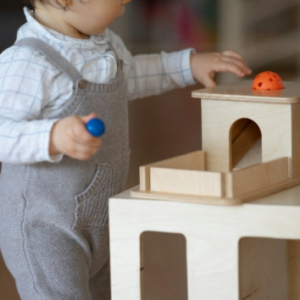At Kynd Montessori, we celebrate uniqueness. We pride ourselves on our Montessori Curriculum and Montessori childcare. Our kindergarten programs are backed by the Montessori learning approach and honour the founder of the Montessori philosophy and Montessori education – Dr Maria Montessori. Our programs encourage each child’s strengths and interests as we look to offer an education for independence, preparing not just for school but for life. Our whole team at Kynd Montessori can’t wait to meet you and your little ones. Contact us today to find out more about our programs.
Choosing the right Kindergarten program: Where to start?
Choosing a kindergarten program and your child starting childcare can be an exciting time full of new experiences, new adventures and new people. However, choosing a kindergarten program for your child can seem like a daunting task. It may feel like so much is resting on this decision, and you may be overwhelmed with choices. The journey to finding a new school and choosing all the classes and programs can be highly emotional and confusing.
This is perfectly normal, and help is at hand.
Remember, you are never alone in the Montessori community. We understand that your child’s happiness is what is most important to you- together we can make their educational experience a memorable and fun one. Contact us anytime for more information. We are always here with a KYND face, helpful information, and support so that you do not feel alone at this time.
We understand that navigating questions such as ‘What curriculum is best?’ ‘What curriculums are available in Australia?’ and ‘What kindergarten programs are available to you?’ along with natural worries and doubts can be both confusing and tiresome.
Below are a few things you should consider when making your choice.
Choose between a private and a public kindergarten
Part of the initial decision-making process is choosing between a public or private education. But what does that mean? What is the difference? Private schools generate their own funds which give them independence and flexibility to offer more specialised programmes and curriculum. When choosing between a private and public kindergarten try thinking about your own philosophy of education. This may seem like an odd turn-of-phrase sound official but simply ask yourself what you want to get out of your child’s education and the environment.
Think about your own philosophy of education.
Whilst contemplating this ask yourself a few important but necessary questions:
- What do you want for your child’s education?
- What does an ‘education’ look like to you?
- For example, is the ideal education environment for you:
- Collaboration and group work?
- A streamlined, rigorous approach to learning?
- Do you want them to experience and explore through inquisitive play?
- Does your child work better alone?
Asking these questions and truly imagining the environment each other lends themselves to will help you envision the learning environment, your child’s everyday schedule, education and growth. Once you have these questions and the answers in place, you can look to a kindergarten that shares the same philosophy (this can be through their core values, their community, their curriculum or their after-school activities).
Consider the whole school community.
We say this often, but a child must have a learning community to grow emotionally, socially and mentally. But as the saying goes; It takes a village to raise a child.
Research has shown that School and family partnerships have a profound impact on a child’s outcome and well-being.
Parents, as primary educators, play a significant role in educating their children as they shape and challenge the values and character of their child. It is a significant partnership as educators we share, as together we look to nurture and offer our young people much hope in themselves and the ever-changing world they co-create.
When looking for a kindergarten programme it is easy to focus on the teachers than the school programmes themselves. Sure, educators are important, but it is vital to consider the school and the community as a whole.
Check out what they have to offer to get you involved, research their before/after-school programmes and explore the daily school schedules.
As a learning community, Kynd Montessori seeks to engage parents in their children’s education in a range of ways that place value on building a sense of community and developing authentic relationships. We offer many opportunities for parents and staff to come together through our many programs, including The Early Works Program.
EarlyWorks means easy access to records of your child’s progress, straightforward communication between parent and educator, and simplified event forms and documentation of tasks and checklists.
Explore the daily school schedule and before/after school programs.
Look for a kindergarten program that motivates your child’s passion to explore inside and outside of the classroom. A child’s mind needs to expand, to be free and to see the wonders of the world. School programmes (whether inside or outside school hours) should feed this development. Developmentally unstructured (but monitored) playtime is essential for children at the kindergarten level and adds to their experience. During this time children are free to play, spend time socialising and explore their interests. This is also a great opportunity for you to get involved in the community and ask if there are any parental engagement programmes.
Many kindergartens offer afterschool programmes called ‘enrichment programs’. Ask the school about enrichment programmes on your initial visits.
Search for a balanced curriculum.
A balanced curriculum has explorative play, and strong social/emotional programs but also provides time for academic learning. During these programs, children should learn problem-solving, independence and teamwork Toddlers require stimulation, patience and energy and thrive in an active, social environment with their peers. During your child’s developmental stage, they are starting to both understand, navigate and test the world around them and comprehend where they fit within it. A well-rounded breadth of kindergarten programs that focuses on the child’s whole development can be crucial for their mental, environmental and social development, as they start to grow their character, self-esteem and self-awareness.
Montessori is an education for independence, preparing not just for school but for life.
- Dr Maria Montessori
At Kynd Montessori Preschool, our caring team respect the needs of every child, ensuring they feel safe, secure and valued within our personalised learning environment. As teamwork is a vital skill in life, we embrace inclusivity and interactivity. We also encourage children to be caring in their social interactions with peers, within both indoor and outdoor play.
What curriculums are available in Australia?
My Time, Our Place (MTOP)
The Curriculum Framework for MTOP is comprised of three interrelated elements; Principles, Practice and Outcomes. The main core principles value that a child has a strong sense of identity, and well-being to raise confident effective communicators that are involved, connected and contribute to their world.
Early Years Learning Framework (EYLF)
Early Years Learning Framework lies a specific emphasis on play-based learning and recognises the importance of communication, language and social and emotional development.
Fundamental values of the curriculum framework are that the earliest development takes place through relationships and that children’s life is characterised by Belonging, Being and Becoming connected by family, community, culture and place.
Montessori Childcare
The Montessori Method of education nurtures and accommodates complete academic foundations through interest-based learning. It is designed with multiple learning styles and educational materials in mind, which makes it both versatile and diverse.
Montessori is unique in its practice, education materials and its prepared environment (also known as the Montessori Classroom) which are unlike any standard Childcare centre in Australia.
The Montessori classroom is a carefully considered space, filled with educational materials personalised to each child’s learning style, needs and specific stages of development. Children develop through child-led, self-paced, hands-on experiences using problem-solving skills and real-world applications.
At Kynd, our learning curriculum incorporates both the Montessori Method and Early Years Framework. Based on individual needs, each child has their own program which fosters development and positively challenges them.
Our centre has been created specifically to cater to the needs of parents and children seeking a quality educational experience in a nurturing environment. Our Early Works Program keeps you up to date with daily reports, as well as monthly observations of your child’s progress. We also believe it is important you and your child feel included and consulted through the process and planning of the curriculum design.
Childcare ratio, staff retention and personalised learning
A tailored curriculum and class size go hand-in-hand. It can be the difference between a good and an amazing school experience and can help students engage more academically and socially. One of the utmost important parts of a child’s learning is ensuring they feel valued, appreciated and listened to. Research has shown that a lower child-to-career ratio and good staff retention are essential in ensuring every child’s needs are met, not just on an educational, but also, on an emotional level. Be attentive to class size.
At Kynd Montessori Childcare, we choose to have smaller class sizes to increase 1:1 interaction time between educator and child. The more time we put into our children, the greater they thrive in their creativity and social adjustment. The ability to adapt to the ever-changing complexities and problems of life is seen as a predictor of future schooling and life success. We feel that every child’s experience is important and that is why we use a 5:1 Toddlers to Educators 10:1 Preschools to Educators. This ensures there are only 29 places for 10 toddlers and 19 preschoolers with 8 qualified teachers with decades of experience so that your child can have personalised, individualistic learning and receive the attention they deserve.
Seek enthusiastic teachers that inspire play and fun
One of the most important parts of choosing the right kindergarten program for your child is the teachers. Teachers make a school. Sure, it is important to ensure all the needs are met academically but that also extends to the teachers. Look for a kindergarten teacher that thinks creatively, encourages creativity and is committed to furthering your child’s growth. What’s more, look for a school that is committed to furthering the education of its teachers. Once again, it’s important to have the spirit of a learning community that comes together to create a whole network that sets the foundations and support to tackle all the obstacles, anxieties and development stages.
After all, learning should be fun!
Learning should be fun!
That brings us to our next point: Fun. Remember fun? Before bills, deadlines and the stress of … life. Those carefree days were full of adventures and fun with the joy of learning and experiencing everything for the first time. You want to get the right kindergarten program and environment where the child feels happy, involved and the joy of learning. Ensure the kindergarten program stimulates your child socially, mentally and academically through role-playing, team building and outdoor play.
At Kynd, our education materials and curriculum encourage both active, explorative and inquisitive learning, allowing them to engage in activities they may not have access to at home and instil confidence at an early age.
Outdoor Play
Not only is outdoor play beneficial for the physical health of a child but also the emotional and mental well-being. Childcare centres actively encouraged outdoor play and engagement and typically offer more outdoor space than Daycare centres.
At Kynd, outdoor play is emphasised and embedded within our programs and curriculum. We believe it is important for a child to interact with nature and enjoy the explorations of the outdoors through outside activities. All through a caring and safe environment.
Above all, visit.
Make sure that you visit the daycare centre to get a feel of the environment and ask about its programs. You can schedule a tour to get a better idea of the quality of care your child will receive and what educational resources are available.
Many centres organise initial centre tours to help you get a better feel for the environment, navigate your way around, check the classes, and get a better idea of the quality of care your child will receive. This is also the perfect opportunity for you to ask what programs and educational resources are available.
Attending orientation sessions and centre tours will excite your child for their new adventure and help you to see if the programs and environment are right for them. You may find they settle into some classes more than others and may start to play straightaway with the fun toys that are available to them during the tour.
The initial centre tour will help you get familiar with the services that the centre provides and ask the carers or educators about orientation programs and transition mornings, playgroups, or playtimes for parents and children to help settle in. Taking your child on a little tour to walk through the rooms and get familiar is an essential part of a childcare’s settling-in program and services.
If you have booked a tour at Kynd Montessori, do not hesitate to ask all the questions you need answers to, regarding our hours of operation, fees, our Montessori curriculum, policies on discipline and safety, staff qualifications and more. There is no such thing as too many questions when it comes to your child’s well-being.
What to look for when you visit
Above all look for an inviting place where you feel your child will be comfortable and safe and that provides many programs and learning opportunities.
During the visit, you can meet the teachers and introduce your child to them, which is an excellent way for them to build trust and a bond. It will also be an opportunity for you to ask your child’s centre manager or room leaders for information about the curriculum, teaching methods, activities and settling tips to gauge what will happen in the first few weeks of your child’s childcare journey.
The orientation programmes can also help you and your child to get to know your settings, the early childhood educators, and other children and parents, building on conversations from the initial centre tours.
Talk to other parents and get referrals from friends
When touring the centre, talk to current parents they are a great resource when trying to see if the centre is the right one for your child and is a chance to hear stories about personal experiences to alleviate those doubts you may have.
Likewise, ask your friends about their experiences and get recommendations or referrals. The most important thing is that you understand what kindergarten programmes are available, whether the school is a good choice and can provide all you need and what extra activities the centre has that will benefit you and your child.
Ask questions such as:
- Why did they choose the school?
- What programs do their children enjoy?
- What is the expectation for parent involvement?
- Are they or their children part of any after-school programs?
Parents are usually the best people to gauge the experience you and your child can expect and find out what is great about the school and what is not so great. But remember, everyone’s experience is different and their expectations or wants from a school may differ from your own.
Orientation programs provide you with the chance to hear stories about personal experiences from other parents, children, or educators to alleviate those doubts they may have had when choosing childcare and help you and your child prepare for the separation anxiety that can often occur. Knowing your child is in safe hands in a safe and secure environment for them to grow is the most important part of settling in.
The most important tip of all… ask questions!
No question is too small, too silly or incorrect. Make a note of any questions you have and have them handy with every phone call, visit or teacher-parent meeting. It’s normal to have lots of questions as this is an important step in your child’s educational journey. Ask questions about the curriculum, the academic disciplinary policies, after-school programs, recreational activities and facilities, the lunch programs, school events and any other questions that may come to mind to help you visualise what your child’s daily life will look like.
At Kynd, we like questions as this helps us grow. Here are some questions to ask:
- What after-school programs do you have?
- What is your curriculum?
- Does the curriculum involve outside play? What sort of outside facilities and activities are available?
- Do you encourage teamwork and socialising in your curriculum?
- Do you offer extended care?
- Do you have any lunch programs?
- Do you support children with additional needs? What support is provided?
Look for a kindergarten program with individualised learning
Individualised Learning by Kynd Montessori
Kynd Programs
Our individualise programs include:
- Practical Life
- Sensorial Development
- Mathematics
- Arts and Craft
- Language
- Culture and Geography
- Early Years Learning Framework
- Munch and Move.
We offer our programs for toddlers (2-3yrs) and preschool (3-6yrs). We will continue our support for whatever stage your child is at. Our community is just that: A community for you and your child to be a part of throughout their education and life.
“At Kynd Montessori, a love of learning will not only guide your child through their transition into and during their school years but into their adult life.”-Kynd
Kynd Programs for Toddlers (2-3yrs)
- Identification of common objects, naming colours and naming body parts.
- Numeral recognition and rote counting.
- Speaking in sentences and expressing thoughts and feelings.
- Physical activity participation.
- Ability to use the pincer grip for writing and drawing.
- Demonstration of self-confidence and interacting appropriately with others.
- Physical activity participation.
- Ability to use the pincer grip for writing and drawing.
Kynd Programs for pre-school (3-6yrs)
- Formation of individual letters and numbers.
- Numeral recognition and rote counting.
- Read simple sentences and construct phonetic words.
- Write and recognise their own name.
- Awareness of decimal system, addition and subtraction.
- Physical activity participation and following rules in games.
- Demonstration of self-confidence and interacting appropriately with others.
- Work independently and concentrate effectively.
- Respond to challenges and demonstrate problem-solving skills.
Kynd Curriculum
Our learning curriculum is a combination of the Montessori Method and the Early Years Framework. Each child receives their own program based on their individual needs, to foster development and positively challenge them.
We teach children to become independent learners that trust in their own abilities.
Our approach backed by the Montessori learning approach
The Montessori approach assists children to become:
- Confident
- Responsible
- Independent
- Valued
- Secure
- Respectful
Skilled Observation
One of our most vital teaching tools comes from observation without judgement. Skilled observation involves “following the child”: we study the habits of the child, define their needs and assist them in finding their strengths and capabilities
Respecting the Child
The child is assured of their own abilities by the Montessori teacher. By the teacher entrusting the child with appropriate decision-making challenges, they grow to learn from their own mistakes and develop a sense of judgement whilst respecting others.
The Individual
Montessori learning programs are personalised to each child, based on their individual stage of development, interests and needs. Montessori learning materials guide lesson plans and are presented one-on-one based on each child’s academic progress.
At Kynd, we value and are committed to supporting our families and children. Our staff prepare daily reports for each child on eating, sleeping and toileting. Monthly observations of your child’s progress are also recorded, so if there are any unexpected learning roadblocks they are addressed quickly.
Kindergarten programmes that offer extra help
We all need a little extra help sometimes. When choosing the right kindergarten ask the school about their policy for children that may require extra help or for children who are ahead. Every child’s development is different, and many students work at different levels. Look for a kindergarten that structures its programmes and lessons with this in mind. A child should never feel like they are behind, or they are not inspired, instead, a child should feel motivated and encouraged and their needs understood.
What should I do if I need extra support or have any questions?
If you have questions, talk to your child’s early childhood educators or carers. They can and will help.
Starting childcare and finding the right kindergarten program can be stressful and challenging. It’s very common to feel anxious and uncertain at the beginning of your childcare journey. First and foremost, contact the childcare provider, who will be more than understanding and welcome you to share your questions or concerns. As a childcare team, we are here to support you in any way we can. We are deeply honoured that you have entrusted us with the education and care of your child and strive to create a home away from home for your child and to provide you with a supportive community for you and your family. Look for kindergarten programs that support you as a parent and seek to get you involved. First impressions count, if you feel supported and that all your concerns have been addressed within initial contact chances are you’re on to a winner.
KYND- A learning community with you and your child’s needs in mind
As the saying goes, it takes a village to raise a child.
Research has shown that School and family partnerships profoundly impact a child’s outcome and well-being. It is a significant partnership we share as educators, as together we look to nurture and offer our young people much hope in themselves and the ever-changing world they co-create.
As a learning community, Kynd Montessori seeks to engage parents in their children’s education in various ways that place value on building a sense of community and developing authentic relationships. We offer many opportunities for parents and staff to come together through our many programs. For information on the programs we provide, and any information within our article, reach out to us by email or phone.
We hope our guide has helped. When looking for the right kindergarten program for your child, consider your child’s needs while making the final decision; whether the daycare centre and its programs are a good fit for your child’s personality, interests and requirements.
But ultimately, trust your gut instinct when zeroing in on your decision. If something doesn’t feel right, keep the search going until you find one that you feel the most comfortable with.
Kynd Montessori – A preschool and early learning centre that’s Kynd by name and kind by nature.
We understand that when it comes to childcare and families, it is not one size fits all and that circumstances vary. At Kynd Montessori, we pride ourselves on providing a personalised childcare service to suit you and your child, whatever the circumstances.
We are an educational community that cares. We are here to question with non-judgement, advice and care to provide you with all the information you need. We believe that a parent should feel assisted, listened to and involved through every step of their child’s education, starting from now at the beginning of your child’s journey as well as yours.
To book a visit at Kynd Montessori, please use this form, email us at [email protected] or call us directly on 0426 286 676.







